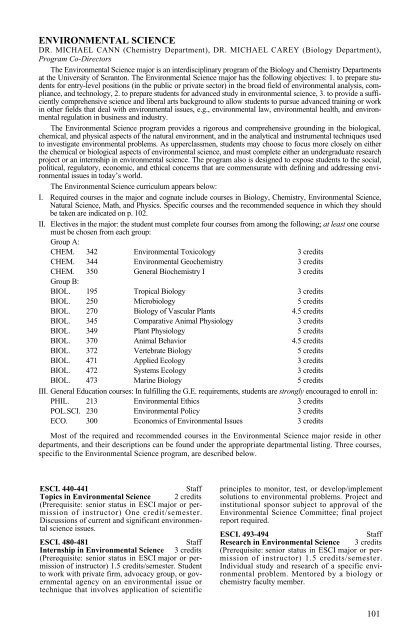You also want an ePaper? Increase the reach of your titles
YUMPU automatically turns print PDFs into web optimized ePapers that Google loves.
ENVIRONMENTAL SCIENCE<br />
DR. MICHAEL CANN (Chemistry Department), DR. MICHAEL CAREY (Biology Department),<br />
Program Co-Directors<br />
<strong>The</strong> Environmental Science major is an interdisciplinary program <strong>of</strong> the Biology and Chemistry Departments<br />
at the <strong>University</strong> <strong>of</strong> <strong>Scranton</strong>. <strong>The</strong> Environmental Science major has the following objectives: 1. to prepare students<br />
for entry-level positions (in the public or private sector) in the broad field <strong>of</strong> environmental analysis, compliance,<br />
and technology, 2. to prepare students for advanced study in environmental science, 3. to provide a sufficiently<br />
comprehensive science and liberal arts background to allow students to pursue advanced training or work<br />
in other fields that deal with environmental issues, e.g., environmental law, environmental health, and environmental<br />
regulation in business and industry.<br />
<strong>The</strong> Environmental Science program provides a rigorous and comprehensive grounding in the biological,<br />
chemical, and physical aspects <strong>of</strong> the natural environment, and in the analytical and instrumental techniques used<br />
to investigate environmental problems. As upperclassmen, students may choose to focus more closely on either<br />
the chemical or biological aspects <strong>of</strong> environmental science, and must complete either an undergraduate research<br />
project or an internship in environmental science. <strong>The</strong> program also is designed to expose students to the social,<br />
political, regulatory, economic, and ethical concerns that are commensurate with defining and addressing environmental<br />
issues in today’s world.<br />
<strong>The</strong> Environmental Science curriculum appears below:<br />
I. Required courses in the major and cognate include courses in Biology, Chemistry, Environmental Science,<br />
Natural Science, Math, and Physics. Specific courses and the recommended sequence in which they should<br />
be taken are indicated on p. 102.<br />
II. Electives in the major: the student must complete four courses from among the following; at least one course<br />
must be chosen from each group:<br />
Group A:<br />
CHEM. 342 Environmental Toxicology 3 credits<br />
CHEM. 344 Environmental Geochemistry 3 credits<br />
CHEM.<br />
Group B:<br />
350 General Biochemistry I 3 credits<br />
BIOL. 195 Tropical Biology 3 credits<br />
BIOL. 250 Microbiology 5 credits<br />
BIOL. 270 Biology <strong>of</strong> Vascular Plants 4.5 credits<br />
BIOL. 345 Comparative Animal Physiology 3 credits<br />
BIOL. 349 Plant Physiology 5 credits<br />
BIOL. 370 Animal Behavior 4.5 credits<br />
BIOL. 372 Vertebrate Biology 5 credits<br />
BIOL. 471 Applied Ecology 3 credits<br />
BIOL. 472 Systems Ecology 3 credits<br />
BIOL. 473 Marine Biology 5 credits<br />
III. General Education courses: In fulfilling the G.E. requirements, students are strongly encouraged to enroll in:<br />
PHIL. 213 Environmental Ethics 3 credits<br />
POL.SCI. 230 Environmental Policy 3 credits<br />
ECO. 300 Economics <strong>of</strong> Environmental Issues 3 credits<br />
Most <strong>of</strong> the required and recommended courses in the Environmental Science major reside in other<br />
departments, and their descriptions can be found under the appropriate departmental listing. Three courses,<br />
specific to the Environmental Science program, are described below.<br />
ESCI. 440-441 Staff<br />
Topics in Environmental Science 2 credits<br />
(Prerequisite: senior status in ESCI major or permission<br />
<strong>of</strong> instructor) One credit/semester.<br />
Discussions <strong>of</strong> current and significant environmental<br />
science issues.<br />
ESCI. 480-481 Staff<br />
Internship in Environmental Science 3 credits<br />
(Prerequisite: senior status in ESCI major or permission<br />
<strong>of</strong> instructor) 1.5 credits/semester. Student<br />
to work with private firm, advocacy group, or governmental<br />
agency on an environmental issue or<br />
technique that involves application <strong>of</strong> scientific<br />
principles to monitor, test, or develop/implement<br />
solutions to environmental problems. Project and<br />
institutional sponsor subject to approval <strong>of</strong> the<br />
Environmental Science Committee; final project<br />
report required.<br />
ESCI. 493-494 Staff<br />
Research in Environmental Science 3 credits<br />
(Prerequisite: senior status in ESCI major or permission<br />
<strong>of</strong> instructor) 1.5 credits/semester.<br />
Individual study and research <strong>of</strong> a specific environmental<br />
problem. Mentored by a biology or<br />
chemistry faculty member.<br />
101
















